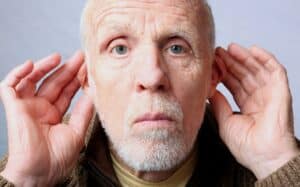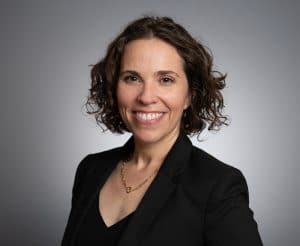Brain Health: Preventative Measures for Dementia

Crossword puzzles. Learning a language. Taking up a new hobby. Recommendations on how to keep your aging brain stimulated are increasingly available. These messages are delivered by healthcare professionals and magazine covers at the grocery store.
And — if you’re lucky — you’ll find wellness programs available in your community. But what happens if you can’t see the crossword clues well enough to read them? Or miss out on key sounds in the Spanish language learning videos?
them? Or miss out on key sounds in the Spanish language learning videos?
Researchers are making increasing discoveries into the role that sensory changes, including hearing and vision, play in the cognitive decline of the elderly.
Aging Brain & Hearing Loss

According to the American Speech, Language, and Hearing Association (ASHA), 48 million Americans experience hearing loss. Of this number, far fewer seek formal assessment and treatment. Even a mild reduction in hearing ability can lead to significant problems, including social isolation, depression, and an increased risk of falls.
Because brain function relies on sensory stimulation, limited input of sounds (including environmental sounds and especially conversation) may result in the atrophy or shrinking, of brain tissue.
As a result, the act of listening, especially to complex topics or in noisy settings, makes the brain work harder, taxing resources in attention and processing speed. In turn, this may lead to frustration and low satisfaction with social interactions. Furthermore, this can potentially lead to withdrawal from communication with others.
Brain Health & Vision Changes
Likewise, vision changes can also lead to cognitive decline. As with hearing loss, the reduced input of sensory stimulation through the vision system results in the loss of brain cells. With less ability to process visual information, individuals with vision impairment minimize physical and social activities. These activities are often the very same ones recommended for optimizing brain health.
Aging Well
Nonetheless, the good news is that both hearing and vision loss are modifiable factors. In addition to diagnosis, treatment options are widely available. However, real barriers to successful treatment exist for many seniors, including the stigma of wearing hearing aids or the cost. Insurance coverage can be limited at best.
Fortunately, as the evidence builds for the dementia-prevention benefits of treating hearing and vision loss, the appeal of these may reach people who are eager to avoid cognitive decline and age at their best. Market innovations are also on the rise. It is anticipated that the FDA will approve over-the-counter hearing aids for mild to moderate hearing loss. This may be coming soon to a pharmacy near you.
As with Most Disease Prevention, Early Detection is Key
As has been noted, there are things you can do to care for yourself as you age.
There are health care professionals that can help you. An audiologist is a licensed health care professional who specializes in identification of hearing loss. This professional is an important partner to determine the best solution to optimize your hearing abilities. Eye care professionals, including

optometrists or ophthalmologists, evaluate eye health and vision abilities and develop a plan to protect against vision loss. Primary care physicians are well suited for conversations about sensory changes and the aging brain as part of their role in dementia prevention.
Friends Life Care members can check in with their Care Coordinator to discuss changes in health too.
Support When you Need It
If you or a loved one notice changes in hearing or vision abilities, seek support sooner rather than later. Because brain-healthy activities are more enjoyable and successful when they come through to our senses.
Check out a webinar recorded as part of Friends Life Care’s VigR(R) philosophy and wellness programming. It is presented by Dr. Tom Goyne. The title is: “The Brain and the Ear: a Two-Way Street”. You can view it on the Friends Life Care Youtube channel.
Contributor:
Lauren Schwabish, M.S., CCC-SLP
 Lauren Schwabish is the owner of Neuro Speech Services. Neuro Speech Services is a private practice based in Northern Virginia. This practice specializes in person-centered assessment and treatment of cognitive-communicative disorders related to stroke, brain injury, concussion, and other neurologic conditions. Lauren received her Bachelor of Science degree with Honors in Communicative Disorders from the University of Wisconsin-Madison. She holds a master’s degree in communication sciences from Hunter College of the City University of New York.
Lauren Schwabish is the owner of Neuro Speech Services. Neuro Speech Services is a private practice based in Northern Virginia. This practice specializes in person-centered assessment and treatment of cognitive-communicative disorders related to stroke, brain injury, concussion, and other neurologic conditions. Lauren received her Bachelor of Science degree with Honors in Communicative Disorders from the University of Wisconsin-Madison. She holds a master’s degree in communication sciences from Hunter College of the City University of New York.
Her license is in the Commonwealth of Virginia. And she is a certified member of the American Speech Language Hearing Association. Lauren has over 21 years of experience working in hospitals and acute rehabilitation centers. And she is passionate about providing meaningful and accessible health education about the brain to patients, families, and health care professionals. Lauren is an engaging public speaker on the topics of memory and thinking skills, committed to empowering communities with evidence-based information and best practices in brain health behaviors.
Image sources
senior woman doing a crossword puzzle at home, elements.envato.com/user/tommyandone
Friends Life Care appreciates this post about aging well, written for the eMeetinghouse blog. Friends Life Care is a mission-driven nonprofit that has been helping older adults to thrive at home as they age. Connect with us if you have questions for one of our Plan Counselors on joining. Or, if you are a member, for your Wellness or Care Coordinator. We’d love to hear from you.
